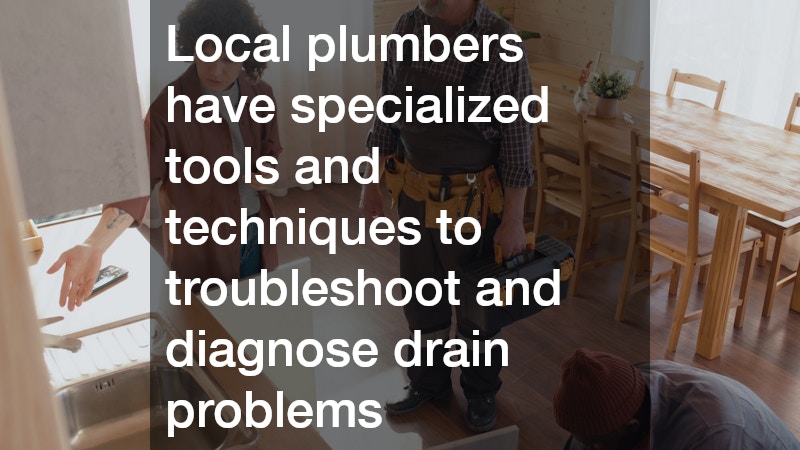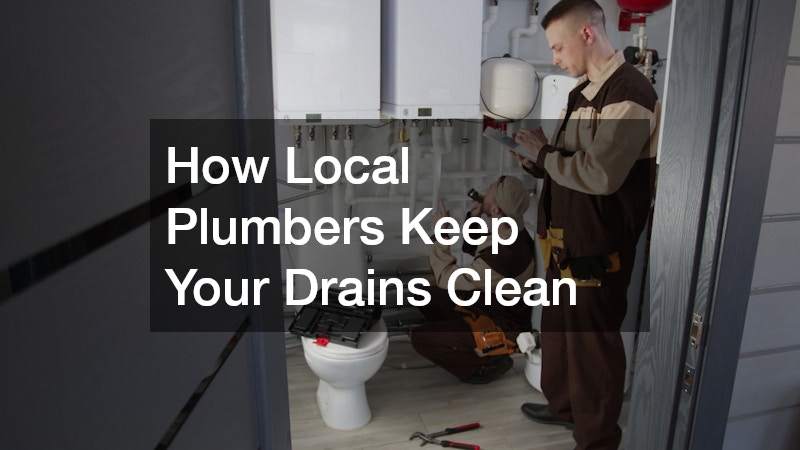Local plumbers play a vital role in maintaining clean and functional drainage systems. Learn answers to some of the most common questions about plumbing services and drain cleanliness. Understanding the intricacies of plumbing can greatly aid homeowners in sustaining their drainage systems and avoiding costly repairs.
Local plumbers bring not only professional expertise but also a familiarity with the unique plumbing challenges in your area, making them well-equipped to handle everything from routine maintenance to emergency repairs. By trusting a professional, you can save time, avoid costly mistakes, and gain peace of mind knowing your home’s plumbing is in capable hands.
Common Causes of Clogged Drains
Clogged drains can be caused by a variety of factors. Hair, food particles, grease, and soap scum often accumulate in pipes and contribute to blockages. Leaves and other debris can also lead to clogs, especially in outdoor drains.
Another prevalent cause of drain issues stems from foreign objects mistakenly flushed down toilets or rinsed down sinks. These items can create significant blockages that disrupt the flow of water. Chemical buildup from cleaning agents can additionally exacerbate the situation.
Understanding these causes can help homeowners take preventive measures. By being mindful of what goes into the sinks and toilets, homeowners can drastically reduce the chances of facing a major clog. Regular maintenance and monitoring are key steps in keeping drains clear and functional.
How Local Plumbers Diagnose Drain Issues
Local plumbers have specialized tools and techniques to troubleshoot and diagnose drain problems effectively. One of the most common tools employed is a plumbing snake, which effectively removes blockages. Additionally, professionals often use video inspection cameras to get a firsthand look at the inner workings of the plumbing.
The diagnostic process typically begins with a thorough inspection. Plumbers will look for visible signs of trouble, such as slow drainage or unusual noises. They may also ask homeowners about any symptoms their plumbing systems are exhibiting to narrow down the issues.
Once a diagnosis is made, plumbers can recommend an appropriate course of action. Whether it involves cleaning, repairing, or replacing pipes, informed decisions can be made to ensure the longevity of the plumbing system. This diagnostic ability is crucial in efficiently addressing and preventing plumbing issues.
Preventive Measures Homeowners Can Take
Prevention is key to maintaining clean drains. Here are some strategies homeowners can implement. Firstly, using drain covers can significantly minimize the amount of hair and debris that enters the plumbing system. Regularly cleaning these covers can further enhance their effectiveness.
Avoiding the disposal of cooking grease down the sink is another essential preventive measure. Instead, homeowners can store grease in a container and dispose of it securely. Additionally, running hot water through the drains after washing dishes helps prevent build-up.
Being vigilant about what goes down the drain is crucial in preventing clogs. Homeowners should refrain from flushing anything other than toilet paper and human waste. These simple practices can greatly reduce the need for professional intervention and improve the overall health of the plumbing system.
Plumbing Tools and Techniques Plumbers Use
Plumbers utilize a range of techniques and equipment to clear drains and maintain them for optimal performance. Hydro jetting is a powerful method where high-pressure water is blasted through the pipes to clear severe blockages. This approach ensures that pipes remain clean from the inside out.
In addition to hydro jetting, plumbers may use augers and snakes to dislodge clogs. The flexibility of these tools allows them to reach deeply embedded blockages. Each tool serves a distinct purpose, enabling plumbers to tailor their approach based on the severity of the clog.
Modern plumbing has also incorporated technology such as video inspection tools. These advanced cameras allow plumbers to visualize the condition of pipes and identify issues without invasive measures. Such technology not only saves time but also money for homeowners, making the plumbing process more efficient.
When to Call a Local Plumber
Knowing when to call a professional can save you time and money. If homeowners begin to notice slow-draining water or frequent clogs, these can be signs of larger issues lurking within the plumbing system. Ignoring these symptoms can exacerbate the problem and lead to costly repairs.
Unusual odors emanating from drains are another indicator that a plumber should be contacted. Such smells can suggest the presence of decomposing material or sewage backing up into the system. Promptly addressing these odors can prevent health risks associated with unsanitary conditions.
Finally, if multiple drains are clogged simultaneously, this could indicate a more serious blockage in the main sewer line. This situation necessitates immediate professional attention to avoid significant damage to a homeowner’s plumbing infrastructure. Understanding these signs is crucial for effective home maintenance.
Keeping drains clean is essential for a healthy home. By understanding the role of local plumbers and following preventive measures, homeowners can ensure their plumbing systems function efficiently. Investing time and resources into plumbing health can extend the life of the system and save significant money down the line.

